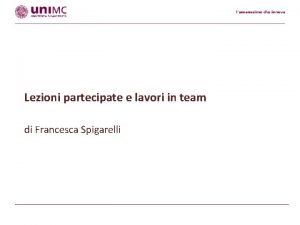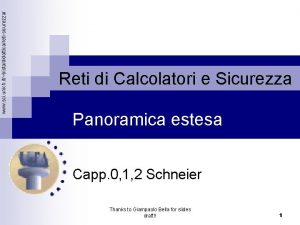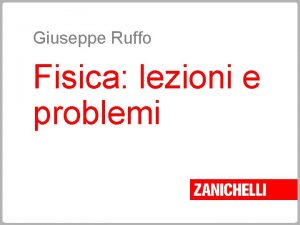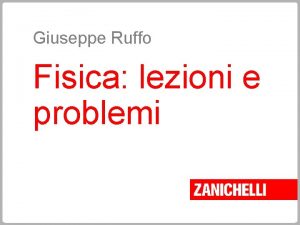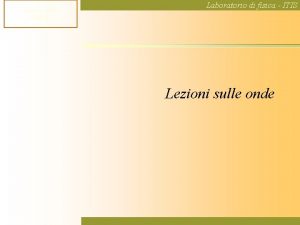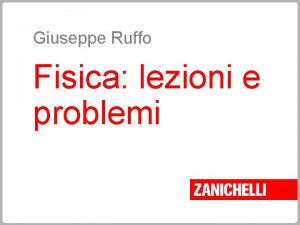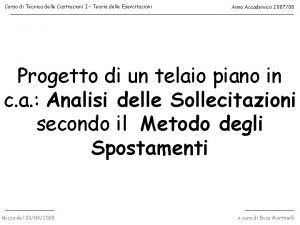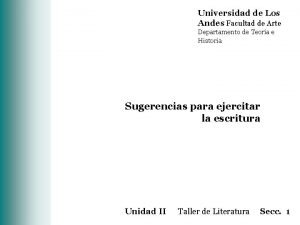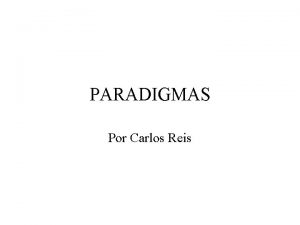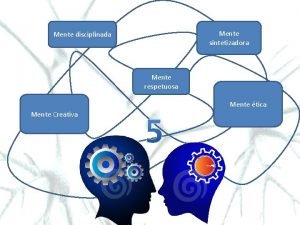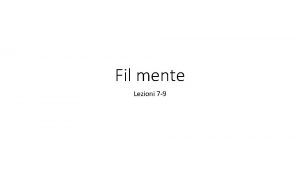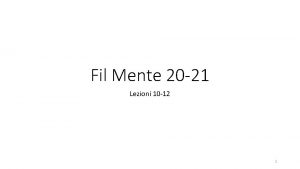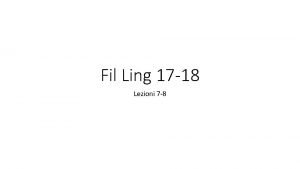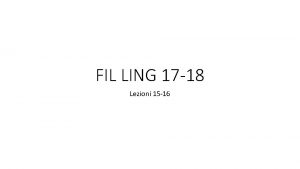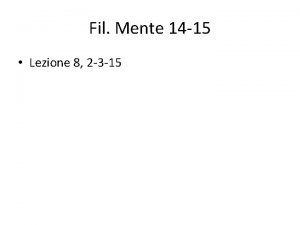Fil Mente 16 17 Lezioni 28 30 Lezioni



















- Slides: 19

Fil Mente 16 -17 Lezioni 28 -30

• Lezioni 28 -29 • 10/4/17

Presentazioni • OGGI • Vitangeli su agent causation • Mammarella su realizzabilità multipla • DOMANI • Ercoli su Hill sui qualia

-Lowe, PA, parte II (libertarismo) - Compatibilismo - Eliminativismo sul libero arbitrio

Il dilemma del libero arbitrio • Se la mia scelta è causata dalla situazione precedente (dallo stato precedente del mondo e dalle leggi di natura), allora non è libera in quanto determinata. • Se la mia scelta non è causata dalla situazione precedente, allora non è libera in quanto casuale.

The libertarian's dilemma (da Personal Agency) • The problem may be posed in the form of a dilemma. • All of our actions, including our supposedly free ones, are (it may be said) just events, and all events are either causally determined by prior events or else are chance occurrences (though their chances may be fixed by prior events). Either way, there is no room for the notion that we are the authors of our actions in any sense that would suit the libertarian. (p. 160). • Alternativa respinta da Lowe: compatibilismo, fisicalismo, le ragioni sono cause • Lowe vuole uscire dal dilemma riscattando il libertarianismo • (Lo strumento: riduzione di event causation a substance causation (p. 162); ma è veramente questa la chiave? )

Lowe su personal agency • not every case of a substance’s acting in some specific manner—is caused. By ‘caused’ here I mean, of course, caused by a substance acting in some manner (Lowe, Personal Agency, 154) • Such an event will be an exercise of a ‘spontaneous’ power of the substance concerned • neither as a power whose exercise is characteristically determined by the causal influence of other objects, nor as one whose manifestations are merely the outcome of chance. Rather, we conceive of it as being a power that is characteristically exercised in the light of reason.

Free will consists in acting for a reason The agent in deliberation typically weighs it against other reasons and chooses it with a mental act of free choice (a volition) The volition typically causes a physical (bodily) event (p. 177, qui c’è un richiamo a downward causation, causal closure principles e a come queste cose sono state addomesticate nella parte I del libro) The volition is UNCAUSED (spontaneous), thus comparable to indetermined events in QM (atom decay), but not irrational or pure chance, because based on reasons, which are NOT CAUSES

What are reasons for actions? Nel cap. 9, p. 184, L. dice provvisoriamente (n. 7, p. 184) che sono stati di cose (obtaining state of affairs = Fact) Nel cap. 10 precisa che sono «needs» (all’incirca le practitions di Castaneda) Io, come Castaneda, parlerei di proposizioni (contenuti di credenze) e praticazioni (contenuti di desideri, intenzioni, volizioni) E direi che le ragioni per le azioni sono sia proposizioni che praticazioni: si veda l’es. a p. 181, dove si considera come ragione per l’azione la credenza che mi sta arrivando addosso una roccia; ma aggiungerei anche il desiderio di non essere colpito, l’intenzione di spostarmi. L. Si dichiara «esternalista» (già nell’introduzione). Intende dire che le ragioni non sono stati psicologici interni, ma i contenuti di tali stati, che sono esterni, in quanto non dipendenti per la loro esistenza dal fatto che qualcuno li creda, desidera, ecc. A volition that is caused (and thus compelled) by belief and desire STATES is NOT free (pp. 180 -181) Role of indeterminism. See next slide.

Arbitrary, if uncaused? • The choice, qua uncaused, is not causally determined by prior events. It is indeterministic. • But, is it then arbitrary? • The replay argument (by Van Inwagen; discussed at p. 190 and also at p. 682 of the 2005 PPR paper «Indeterminist free will» (co-authored with H. Mc. Call) is a mental experiment intended to convince us that the answer is 'yes'. • Jane must deliberate: lying or truthtelling. • Assuming the choice is undetermined, if God were to "replay" things we would see more or less 50% of the times truthtelling choice and 50% lie choice arbitrariness!

Lowe's reply • It is not just the single act of choice that is a chance event • The whole deliberation process is an indeterminist process with the following characteristics: • There is a "choice-set" of possible options in the deliberator's mind: A, B, C, . . . , BELIEVED to be open • If her brain is in state N before the decision, each motor neural state n(A), n(B), n(C) [each causing a distinct bodily movement that initiates the implementation of an option], must be physically possible, given N, during the deliberation period.

Lowe's reply (cont. ) • The probabilities of the option change continuously during the process until the end • But not by chance, but because, the deliberator, Jane, evaluates reasons, without knowing how she will choose • She weights [assegna pesi] and weighs [pesa] the reasons • If God ordered a replay, the outcome might be different, BUT this is because she would have judged on the basis of different(ly weighted) reasons (PPR, p. 684). • What tilts the balance? Jane's character (p. 687)

Questions • But what makes it possible that, in a replay, Jane judges differently? • It seems it is due to different reasons coming to her mind, or to her weitghing reasons differently? • But how is this possible, given that her character is held constant (as it is seemingly assumed)? • Is it then that God caused certain reasons to surface in Jane's mind? But, if so, it is not an accurate replay (it is as in replaying a film, we insert an extra fotogram)

• Lez. 30 • 11/4/17

• Presentazione di ogggi • Ercoli su Hill sui qualia

Compatibilismo • Determinism: the laws of nature and any given state of the universe causally necessitate any future state of the universe • Compatibilism: determinism is true and yet there is free will • See the entry on compatibilism in SEP • An extremely well-argued defense of compatibilism is in ch. 11 of C. J. Ducasse, NATURE MIND AND DEATH (1951)

Ducasse • se si ammette che una volizione causa un’azione ma non è essa stessa causata/determinata da una serie di fattori precedenti (gli eventi nei quali si è trovato immerso l’agente, la situazione in cui si trova ora, ecc. ), si sta dicendo non che la volizione è libera, ma che è fortuita, casuale (p. 192) • Ma non c’è «objective fortuity» (accettazione del determinismo, nonostante QM) • «what we will in given circumstances … is determined by … the nature of those circumstances, as well as (in some cases) by some earlier volitions of ours; and … in all cases also by … the particular kind of volitional nature which happens to be our own» (p. 193) • «freedom of choice consists in having a choice; and having a choice consists in being aware of alternatives» (p. 195) • «his [un certo agente] choosing is determined by the fact that one of several possible ways of proceeding … is preferred by him. … But a choice determined by this – by his preference – is precisely what is meany by ‘free. ’ Hence, the disjunction commonly taken for granted to exist between determinism and freedom is illusory»

Eliminativismo riguardo al libero arbitrio • Hard determinism: il determinismo è vero, ma non è compatibile con il libero arbitrio (terminologia di W. James); posizione raramente sostenuta; attribuibile nel ’ 700 al barone d’Holbach e nel ’ 900 da Paul Edward • Ma adesso ci sono molti che comunque negano il libero arbitrio, pur non impegnandosi al determinismo. Fondamentalmente accettano entrambi i corni del dilemma del libero arbitrio: incompatibilità sia col determinismo che con l’indeterminismo (Galen Strawson, Ted Honderich, Paul Smilansky) • Argomento importante che viene usato: non possiamo scegliere il nostro carattere morale • Smilansky è un caso interessante. Da un lato argomenta a favore di un generale senso di compassione: in un senso profondo nessuno ha colpe o meriti. Dall’altro a favore dell’ «illusionismo» , la necessità di continuare a credere nel libero arbitrio nell’interesse dei valori morali e del nostro senso di dignità.

• Shariff e Vohs (Le scienze, Agosto 2014), indagine empirica sull’idea di una società dove non si crede nel libero arbitrio. • Si tende a essere più indulgenti verso chi commette un crimine • Ma aumenta la tendenza a commetterli, a violare le regole per ottenere ciò che si vuole tendenza all’anarchia • Conclusione dell’articolo: «che farà la nostra società se si troverà priva del concetto di libero arbitrio? Potrebbe benissimo reinventarlo»
 Lezioni partecipate
Lezioni partecipate Sistema lineare impossibile esempio
Sistema lineare impossibile esempio Lezioni online unich
Lezioni online unich Baricentro fisica zanichelli
Baricentro fisica zanichelli Elementi di statistica descrittiva
Elementi di statistica descrittiva Dott armonico giuseppe
Dott armonico giuseppe Nad+ cos'è
Nad+ cos'è Liceo sportivo dolo
Liceo sportivo dolo Liceo galileo galilei dolo
Liceo galileo galilei dolo Accelerazione negativa
Accelerazione negativa Fisica lezioni e problemi 1 soluzioni
Fisica lezioni e problemi 1 soluzioni Lezioni di fisica sulle onde
Lezioni di fisica sulle onde Legge di stevino generalizzata
Legge di stevino generalizzata Liceomontanari.it
Liceomontanari.it Lezioni di tecnica delle costruzioni
Lezioni di tecnica delle costruzioni Fisica: lezioni e problemi 2 soluzioni
Fisica: lezioni e problemi 2 soluzioni Arquitecto mbti
Arquitecto mbti Como convertir secuencias en un texto cohesionado
Como convertir secuencias en un texto cohesionado Deve-se ter em mente
Deve-se ter em mente Dal punto di luce entro la mente di dio
Dal punto di luce entro la mente di dio
